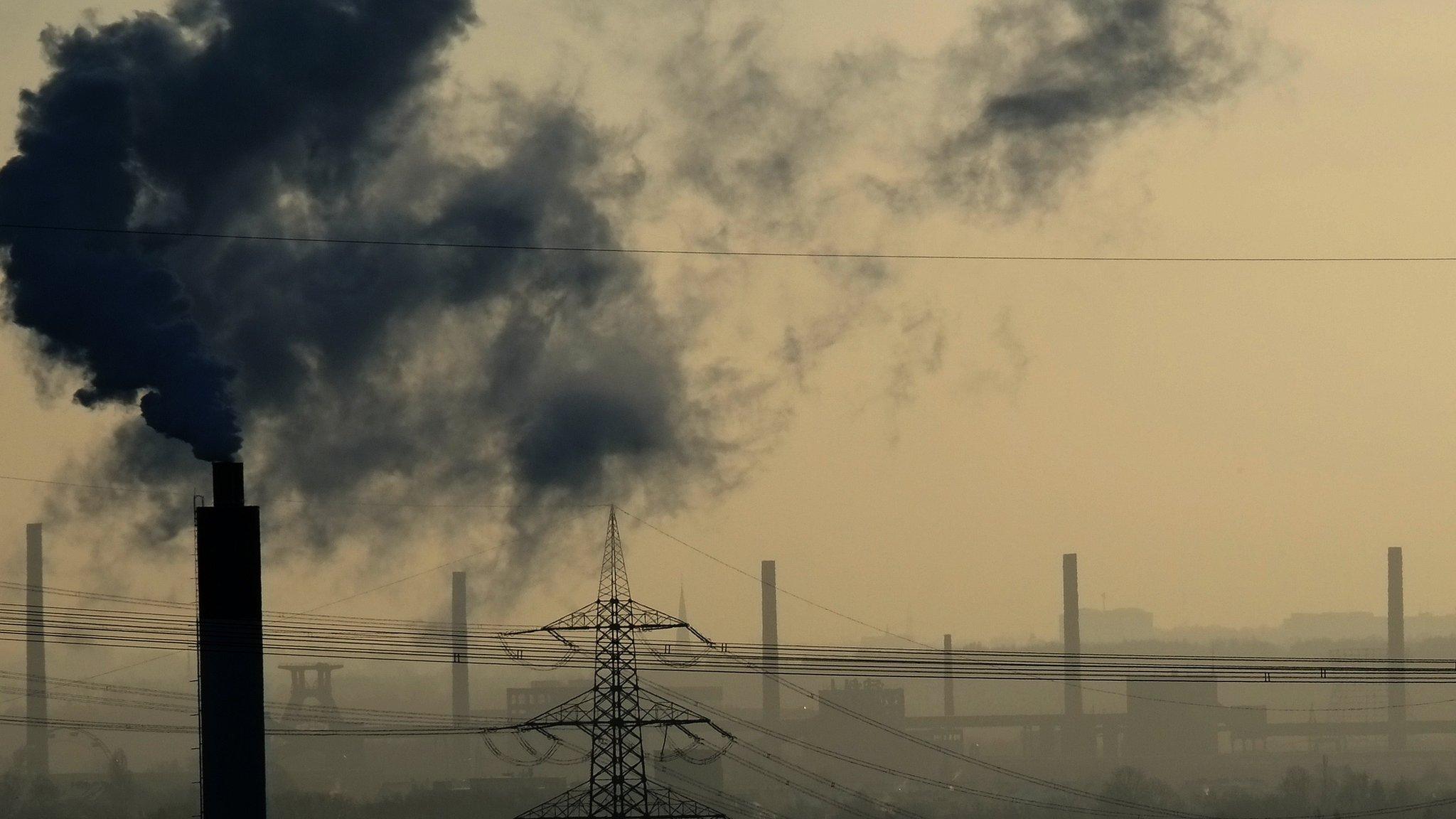Are energy companies sitting on unburnable reserves?
- Published
What are "stranded assets"? This video explains the concept
Are we approaching the twilight of the fossil fuel era?
A few years ago that question would have seemed absurd. But a combination of forces is squeezing carbon assets like never before.
The oil price remains stubbornly low. Renewables are becoming more affordable and moving into the mainstream.
On top of that, some investment managers are now beginning to question the value of their holdings in carbon fuels as the pressure builds for the world to limit climate change by reducing carbon emissions.
Some observers believe energy is at a potential tipping point.
Much of the pressure was initially triggered by a man in a small office in central London – a man with a question.
Mark Campanale, a former City investment manager, mused: how much of the reserves of oil and gas written in the reserve books of the world's energy giants could we actually go ahead and burn in our cars and our power stations while sticking to the promises governments were making on limiting climate change?
He found to his surprise that no-one had done the sums.
The research he commissioned showed that energy companies have already found more coal, oil and gas than we can burn if politicians keep their promise to hold the global temperature rise below 2C.
The report produced a shock-wave. Academics from University College London finessed the findings, warning that we must not burn 80% of our coal, 55% of our gas, and 30% of our oil if we want to meet agreed targets on carbon emissions.
Meanwhile, a pressure group, 350.org, began urging faith organisations, foundations and pension funds to withdraw funds from fossil fuels, arguing it is morally wrong to put your money in carbon fuels. So far, more than 220 institutions have taken the decision to divest.
These include the heirs to the Rockefeller, external Standard Oil fortune and the board of trustees at California's Stanford University, external. This week students at Harvard are calling on that university to follow suit.
Even the Bank of England, external has joined the fray. It’s investigating whether fossil fuel stocks could cause a destabilising "carbon bubble" in financial markets.

Students at Harvard are calling on the university to pull its funds out of fossil fuels
So far, the divestors are a drop in the ocean. The great majority of investment managers are sticking with oil stocks. They acknowledge the climate-related risks but believe that with growing demand, particularly in developing countries, the future of oil and gas will be rosy for decades.
A third group of investors is taking a different strategy – keeping their money in fossil fuel stocks, but raising uncomfortable questions at company AGMs.
Saker Nusseibeh, chief executive of Hermes fund managers, is one these. He told me that concern in the City over the climate to fossil fuels is still small – but growing.
“I think 10 years ago it was consigned to people much more concerned by environmental issues – tree huggers, if you like,” he said.
“The fact that people are thinking about it in the mainstream is quite new. And I think that the regulator thinks of it as a source of risk for the City of London is particularly interesting – and new.”
BP and Shell have both agreed to support shareholder motions mandating more transparency over the risks to their fossil fuel assets from climate policies. But both maintain the future will offer a version of business as usual.

We still rely heavily on fossil fuels
In a statement, BP said: “Affordable, secure and sustainable energy is essential for economic prosperity. We expect energy demand to grow by nearly 40% - driven by the developing world. To meet this demand a diverse mix of energy sources will be needed – including fossil fuels.”
Shell concurs: “Shell has already been increasing transparency and engagement on emissions and climate change; we need a balanced debate, global thinking and effective forward looking policy and regulation that can deliver more energy for less carbon.”
But while the industry is paying attention to the questions being raised, one industry source told me the oil giants simply don’t expect governments to keep their promises to cut carbon emissions. They plan, the source told me, to keep seeking more fuels in the expectation that they will get burned.
And so far the price of borrowing and the price of shares for oil industry majors also reflects that expectation: that energy companies will be able to sell their reserves for the foreseeable future.
But oil bosses are becoming more vocal, speaking up on behalf of their industry. Shell’s CEO recently condemned what he said were naive voices calling for rapid decarbonisation of the global economy.
"With an exceptional effort, as much as 25% of the world's energy could come from renewables by 2050," said Ben van Beurden. "But non-renewable forms of energy will have to make up the rest."
The UK's former climate change ambassador John Ashton has condemned his comments. The oil giants, he says, will have to choose which side of history they are on.
Follow Roger on Twitter @rharrabin
- Published21 March 2015

- Published7 January 2015
